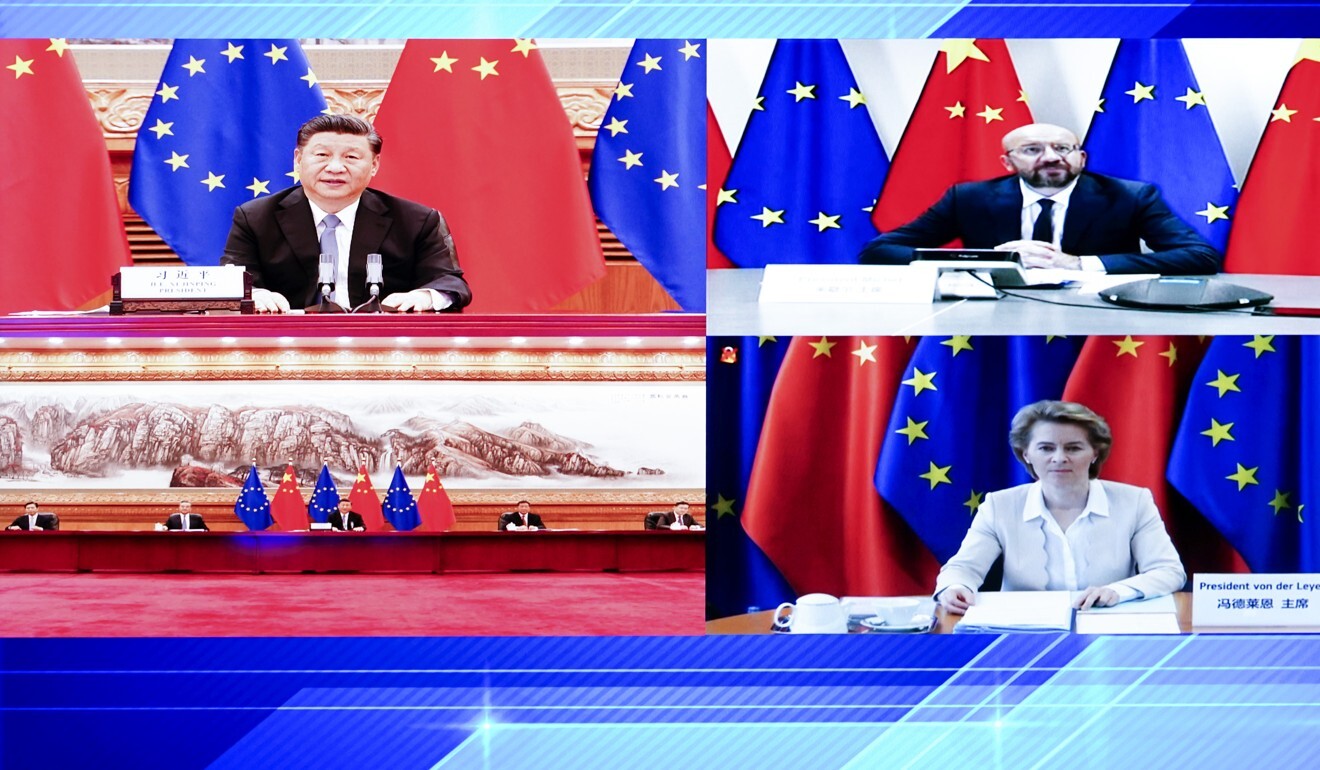
EU leaders talk tough to Beijing over long list of unmet promises
- European Commission President Ursula von der Leyen says EU-China relationship ‘not an easy one’ after first meeting
- Points finger at Chinese for cyberattacks, disinformation campaigns and warns of negative consequences over Hong Kong security law
As she and European Council President Charles Michel took to the press podium after the two long summit calls – first with Premier Li Keqiang and then with President Xi Jinping – von der Leyen laid out her tactics: identify areas of cooperation, before combing through the ways China had under-delivered on its promises, one by one.

She pointed the finger at China for “cyberattacks on computing systems, on hospitals”, adding sternly that “we know the origin of the cyberattacks”.
On disinformation campaigns, “we pointed out this cannot be tolerated”, and on the subject of Hong Kong she spoke of “very negative consequences” should Beijing go ahead with the national security law. None of these issues appeared in Chinese state media reports of the summit.
According to an EU source, the German minister-turned commission president sought outside expert advice on China during her preparation for the summit with Xi and Li.
“Von der Leyen restored a bit of toughness and clarity after months of mixed EU messages,” Noah Barkin, senior visiting fellow at the German Marshall Fund think tank, said.
“She made clear that Beijing has not moved nearly enough on the investment deal, called China out for cyberattacks and disinformation and warned of serious consequences on Hong Kong. But this is rhetoric. The true test for the EU will come if and when Beijing refuses to budge,” Barkin said. “Is there a plan B? That’s not clear.”
At a time when Beijing was already risking Washington’s constant threats of economic decoupling, Xi took the opposite approach, downplaying the differences with the EU in a bid to steer the bloc away from more unfavourable measures against China.
According to Xinhua, Xi – seated in front of a screen at party headquarters in Zhongnanhai – told his EU counterparts “China wants peace instead of hegemony”.
He went on to say that China was “a partner, not an opponent” to the EU, and would continue to deepen reform and expand opening up, providing Europe with a new round of cooperation opportunities and development space.
“No matter how the international situation changes, China will take the side of multilateralism and adhere to the global governance concept of extensive consultation, joint contribution and shared benefits,” Xi said.
EU urges Xi: drop Hong Kong security law or risk ‘negative consequences’
China, though, failed to win the EU’s approval for its vow of multilateralism, with Michel saying: “We have to recognise that we do not share the same values, political systems, or approach to multilateralism.”
The big issue confronting the EU is World Trade Organisation reform. While the US’ hostile approach to the WTO was not welcomed in Brussels, the EU was equally dismayed by Beijing’s lack of efforts to cut down on industrial subsidies.
With the EU and China failing to reach a communique after this year’s summit, von der Leyen made no attempt to hide the slow progress towards an investment treaty, slated for conclusion by the end of this year.
“We need to follow up on these commitments urgently,” she told reporters. “We also need to have more ambition on the Chinese side in order to conclude negotiations on an investment agreement.”
She called on China to devote more high-level political momentum to its talks with Brussels – a veiled attack on Beijing’s one-sided focus on negotiations with Washington.
China puts focus on consensus, EU highlights differences after summit
“The EU has laid down its rules and fired a shot across Zoom’s bow,” an EU source said after the summit. “The ball is now in Xi’s court.”

